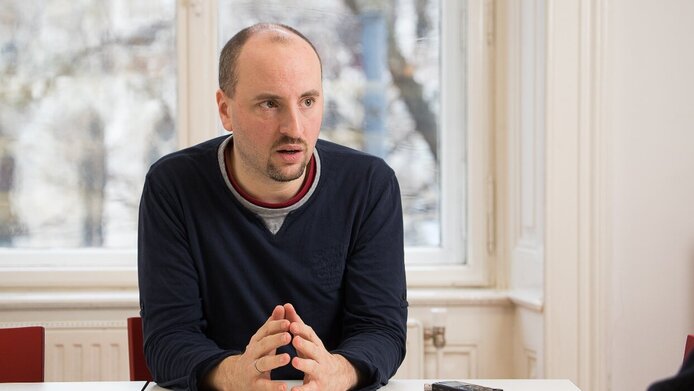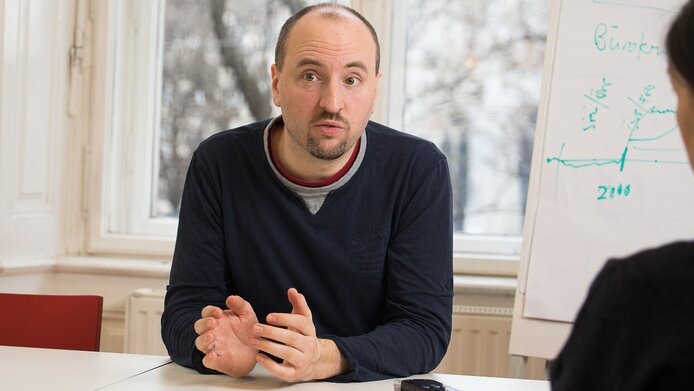“People want to have a greater say”

FWF: In a recent commentary, one of your colleagues maintained that political sciences were more relevant than ever given the fact that populist and anti-democratic movements are getting stronger. Do you agree? Laurenz Ennser-Jedenastik: We have found that the media are indeed showing a greater demand for expertise, particularly, of course, in the run-up to elections. But I agree there are also political trends that contribute to the growing relevance of our discipline. Also, empirical research has increased tremendously in Austria over the last ten years or so, and that gives us a boost. So, there's also a greater supply that promotes growing demand. FWF: One of the things you're referring to here is the large-scale national election studies within the context of AUTNES. That project was initiated in 2009 with funding from the FWF.
Ennser-Jedenastik: A great deal has happened since then. Today, we have a completely different data basis. AUTNES is an integrated election study conducted for every national election. It examines the interaction between party behaviour, electoral behaviour and the media to get a better understanding of how democracy works in Austria. In that respect, we are currently one of the countries in Europe with the best empirical grounding. Moreover, we are well connected internationally in the field of political science. FWF: After some 18 years, the Freedom Party (FPÖ) is back in the government and is significantly shaping Austria’s political landscape. One of the things the FPÖ calls for is more direct democracy. Do we need a democratic reform? Ennser-Jedenastik: That depends very much on what it involves. We don’t know enough about that yet from a scientific perspective. It's interesting to note that the political scientists I talk to are very sceptical about direct democracy. Maybe it has to do with the fact that we have a relatively profound knowledge of the complexity of political decisions and know that these involve a lot more than simple yes or no questions. FWF: You maintain that the frequently cited “will of the electorate” doesn't really exist, because the preferences of the voters are too heterogeneous, and that ultimately the institutions decide how to implement what the electorate wants. Ennser-Jedenastik: The will of the electorate is a fictional notion. It is prone to constant change as a function of how a question is framed. The manner in which people are confronted with a decision has an extremely strong effect on the result. – The Brexit referendum showed this quite clearly. It is not necessarily true that all the people who voted for leaving the EU did so with the same objectives in mind, and what the exit conditions would be was also left open. One of the problems of direct democracy is that things become cemented in place for a long time although additional decisions still need to be taken. I for one would be sceptical about whether expanding direct democracy would effectively help to take more account of the so-called will of the electorate. FWF: Are there any studies about whether the Austrians would like to have more direct influence? Ennser-Jedenastik: There is a small amount of data that seems to suggest that, but we can't determine from that precisely what people would like to have. People want to have a greater say quite generally. The political elites are now called upon to anchor this aspiration in a meaningful institutional framework, which is exactly the reason why we have a representative democracy. In many instances, it's impossible to take decisions through direct democracy. For that, we would need procedures that make sure differing interests are taken into account. FWF: Why is trust in political institutions waning? Ennser-Jedenastik: That seems to be more of a narrative doing the rounds among the public at large. The trends have been relatively constant for the last 10 to 15 years. Compared with other countries, Austrians still have a markedly higher trust in parliament, the government and institutions such as the judiciary or the police. But looking at the current situation, there's potentially quite a large number of people who are not overwhelmingly satisfied with the functioning of our political system. FWF: Is that the reason for the increasingly volatile nature of voter behaviour? Ennser-Jedenastik: An important factor in this context is that young people are now much less closely affiliated to political parties than was traditionally the case. Among Austrians aged 55 and over, almost one in five belongs to a political party. Among the younger generation, it's just two percent. When looking at the Austrian Länder, we find that the parties are more open to each other today. – This openness anticipates the future direction of voting behaviour, which will become even more volatile, and political parties won’t be in power for such long periods.
Generalised discontent seems to be an overrated factor. – Just as a reminder: the previous coalition government between the Social Democrats (SPÖ) and the People’s Party (ÖVP) was not voted out by the electorate, both parties chalked up more votes. I don’t think there was general frustration about the government, but people were dissatisfied with so little progress being made. Discontent always has diverse roots. Not all of the people who criticised the sluggishness of reforms had the same things in mind. It’s not as if policy substance has ceased playing a role. Discontent as such is not the only aspect that decides the outcome of an election. FWF: You already mentioned that Austrian election research also takes media behaviour into account. How would you assess the quality of political reporting amidst the growing competition for ratings? Ennser-Jedenastik: Voters who want to get information about relevant issues can certainly do that, although a large proportion of news coverage deals with things of lesser importance. – That is indeed not specific to Austria, whereas the number of TV shows devoted to election campaigning is. It makes economic sense for the media, but it has hardly any effect on electoral behaviour. The premature national elections in 2017 are a case in point: in May, the ÖVP leadership changed, and then Peter Pilz left the Greens and established a list of his own. From that point onward, the polls showed no change at all, although the Silberstein scandal broke in the run-up to the election, the SPÖ had a rather messy campaign, whereas that of the ÖVP ran smoothly.
FWF: You are a scholar who makes great use of the digital media. You write a blog in an Austrian quality daily, and you are very active on Twitter. What motivation prompts these additional activities? Ennser-Jedenastik: We live on public money, and therefore have a responsibility to make our research public. I see that as being part of my duties as a scholar. Also, there's a certain amount of public interest in political science research, which means there's a public to reach out to. A lot of what we see in the political debate is opinion-driven rather than evidence-based. If I can contribute to shifting the balance, I consider that a big gain. FWF: AUSSDA – The Austrian Social Science Data Archive – was established recently. It is a digital platform that provides access to social science data. Analyses and statistics from election research can be publicly accessed there as well. What role does open access to publications and research data have in the social sciences? Ennser-Jedenastik: The development must certainly go in the direction of more openness because the status quo is completely unsatisfactory. A system that has scientists submitting publications free of charge which publishers then release for a lot of money is not viable. Digitalisation opens up possibilities of emancipating ourselves from that system step by step, even if the route is not entirely clear yet. I see it as essential that we scholars in the social sciences organise ourselves collectively to achieve sustainable solutions.
FWF: Digitalisation in the world of work also requires academics to adopt up-to-date ways of working and new qualifications. What are the requirements young social scientists face today? Ennser-Jedenastik: We need to strengthen methodological training in Austria, both in qualitative and in quantitative terms. Digitalisation as such is not the cause, but it is a trend that fosters these developments. It is therefore important to equip young scholars with the right tools. FWF: Until a few years ago, the social sciences showed one of the lowest rates of project approvals at the FWF. In recent years, the situation has improved gradually. What do you feel are the reasons and where do you see room for improvement? Ennser-Jedenastik: We are undergoing a process of change that will have an impact on the social sciences. Today, the political science community is markedly more international and very well connected. A lot of progress has been made in a relatively short period, which leads to higher quality but also to stronger competition. Hence, we have to enable young people to prove their worth in a competitive environment. For this purpose, we need an attractive research and funding environment and appropriately equipped universities. It's in this latter sphere that I see the greatest deficiencies right now. FWF: What concrete measures would you like the government to take in the field of science? Ennser-Jedenastik: If the government really tops up the FWF budget in the way that was foreseen, that would certainly be a big step forward. And if this is accompanied by measures in university policy, such as making access to study slots more rational, equipping the universities better and creating the prerequisites for us to cater better for the students, it would actually make a real difference. FWF: You also have a degree in composing and music theory. What made you take up political science, and does music have any influence on your current activities? Ennser-Jedenastik: I have always been interested in political science, and so I ultimately decided to focus on the more “solid” discipline. But the study of music gives you an extremely interesting education, opening your eyes to many different things. You learn to listen and reflect in another way, which is certainly not a disadvantage in my current profession.
Laurenz Ennser-Jedenastik studied composition and music theory as well as political science in Vienna. His doctoral thesis dealt with management appointments in independent regulatory bodies. Under an Erwin-Schrödinger Fellowship from the FWF, Ennser-Jedenastik worked as a researcher at Leiden University in 2013. His main research interests include political parties, electoral behaviour, political and administrative elites and state institutions. Ennser-Jedenastik holds a post of University Assistant at the University of Vienna’s Department of Government.
Further reading






